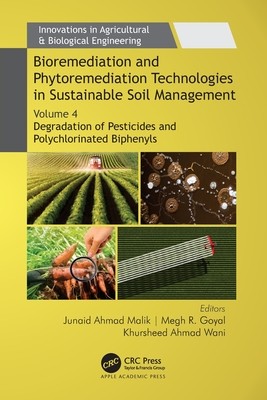
- We will send in 10–14 business days.
- Publisher: Apple Academic Press
- ISBN-10: 177491039X
- ISBN-13: 9781774910399
- Format: 15.6 x 23.4 x 2.4 cm, minkšti viršeliai
- Language: English
- SAVE -10% with code: EXTRA
Bioremediation and Phytoremediation Technologies in Sustainable Soil Management (e-book) (used book) | bookbook.eu
Reviews
Description
This 4-volume set focuses on the use of microbial bioremediation and phytoremediation to clean up pollutants in soil, such as pesticides, petroleum hydrocarbons, metals, and chlorinated solvents, which reduce the soil's fertility and renders it unfit for plant growth. The volumes cover the many diverse eco-friendly microbial bioremediation and phytoremediation techniques for sustainable soil management.
Volume 4: Degradation of Pesticides and Polychlorinated Biphenyls addresses pesticide degradation, PCBs degradation, and genetic interventions. It begins by describing environmental pesticide degradation, mechanisms and sustainability, microbes and microbial enzymes, plant microbe interactions, organophosphorus degradations and endosulfan degradation. It then goes on to discuss PCBs and degradation, cypermethrin, degradation by Phanerochaete chrysosporium, and carvone and surfactants for degradation of PCBs. The book also advocates for genetic systems for degradation of PCBs and pesticides, with discussion of the different advantages and disadvantages for each strategy and the various techniques.
Other volumes in the 4-volume set:
- Volume 1: Fundamental Aspects and Contaminated Sites
- Volume 2: Microbial Approaches and Recent Trends
- Volume 3: Inventive Techniques, Research Methods, and Case Studies
Together, these four volumes provide in-depth coverage of the mechanisms, advantages, and disadvantages of the bioremediation and phytoremediation technologies for safe and sustainable soil management.
EXTRA 10 % discount with code: EXTRA
The promotion ends in 21d.03:39:45
The discount code is valid when purchasing from 10 €. Discounts do not stack.
- Publisher: Apple Academic Press
- ISBN-10: 177491039X
- ISBN-13: 9781774910399
- Format: 15.6 x 23.4 x 2.4 cm, minkšti viršeliai
- Language: English English
This 4-volume set focuses on the use of microbial bioremediation and phytoremediation to clean up pollutants in soil, such as pesticides, petroleum hydrocarbons, metals, and chlorinated solvents, which reduce the soil's fertility and renders it unfit for plant growth. The volumes cover the many diverse eco-friendly microbial bioremediation and phytoremediation techniques for sustainable soil management.
Volume 4: Degradation of Pesticides and Polychlorinated Biphenyls addresses pesticide degradation, PCBs degradation, and genetic interventions. It begins by describing environmental pesticide degradation, mechanisms and sustainability, microbes and microbial enzymes, plant microbe interactions, organophosphorus degradations and endosulfan degradation. It then goes on to discuss PCBs and degradation, cypermethrin, degradation by Phanerochaete chrysosporium, and carvone and surfactants for degradation of PCBs. The book also advocates for genetic systems for degradation of PCBs and pesticides, with discussion of the different advantages and disadvantages for each strategy and the various techniques.
Other volumes in the 4-volume set:
- Volume 1: Fundamental Aspects and Contaminated Sites
- Volume 2: Microbial Approaches and Recent Trends
- Volume 3: Inventive Techniques, Research Methods, and Case Studies
Together, these four volumes provide in-depth coverage of the mechanisms, advantages, and disadvantages of the bioremediation and phytoremediation technologies for safe and sustainable soil management.


Reviews